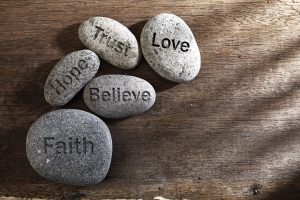“Hope is praying for rain, but faith is bringing an umbrella” – Unknown
The principle of faith is an essential spiritual principle of Alcoholics Anonymous (AA). It is the third spiritual principle, along with the first two principles of honesty and hope. It cements the foundation of functional recovery from addiction.
The first three principles work together and help us on our onward journey of sobriety. Life in a spiritual program is a miraculous experience. The more time the addict spends taking good orderly direction or trusting God, the more they experience a higher level of faith.
People in a recovery program take different paths in their quest for a faith that is not allied with any particular religion, sect or denomination. And yet, they all get to experience this empowering virtue by the sheer energy of revelation.

Ultimately, faith comes down to having total confidence, belief, and trust in a Higher Power or God as you may understand Him. Our faith grows when we take action and see the positive evidence of faith in all activities around us.
Some faith already exists in many areas of our lives, whether we realise it or not. When we get on a flight, we have faith that the pilot knows what they are doing; when we consult with a doctor, we have confidence that they have been trained and licensed to take good care of us.
In Step Three of the 12 Step program, we “Made a decision to turn our will and our lives over to the care of God as we understood Him.”
With this step, the third principle of faith, we are similarly handing over our spiritual car keys, just like we handed our car keys over to someone at a party because we trusted them and had faith that they would stay sober! Turning over your life means learning how to trust yourself, other people, and most significantly, trusting God.
Activating Faith: Trust in God
During our using days, we were continually surrounding ourselves with other broken people. Our trust was broken at so many different times, with so many different people. After we got sober and somewhat stable, we could see things more clearly.
We started looking at life through the lens of faith. And we recognised our part in it all. We were responsible for ourselves in those situations, while we blamed other people for our problems.
In recovery, we begin to be with healthy people. That helps us to trust other people. However, placing our trust in people, places, or things is not the only thing that keeps us sober.
In the experience of so many recovering persons, what helps enormously is their trust in God—admitting a power greater than ourselves overcomes our self-annihilation and destruction of all that was in our path.
Admitting or “letting in” God helps us to end the relentless obsession to use and continues to guide us through recovery towards a joyous, free life.
We discover that we couldn’t control our drug and alcohol problem on our own, but when we came to believe that a loving higher power, which we may choose to call “God”, could relieve us from ‘self-will’, it activated our faith.
Living in Faith: A Broader Perspective

For us, changing our lifestyle activates faith. We start loving the structure of our routine, which is a massive part of what creates the necessary feeling of security and well-being.
Faith alone is not enough; it’s what you do with it that counts and anything worth having aren’t easy. Getting to a relatively spiritual state takes action!
Whether through prayer and meditation, making frequent Gratitude Lists, or going on retreats, we can deepen our faith and get more rooted –but we have to do the work. Our faith rarely gets challenged when we’re doing the work and not trying to take the easy way out like we used to. “Faith without action is dead”, as it says in AA literature.
We can start our recovery program with a sponsor in the fellowship or an experienced therapist. Our first step is to trust the person and follow direction. This prepares us for developing further faith and keeping an open mind to suggestions.
As our faith deepens, we experience more progress and stability in our lives. Things begin to fall in place. This encourages me to take more action. It’s now a process, rather spiritual progress. It gets easier as we move along. We not only trust the process but start to trust others and ourselves.
Our life seems to be more comfortable, and we seem to develop an “instinct” wherein we know what to do in situations that baffled us while using. When we look back at our lives, we were walking around like a horse with blinders on. Living without faith, we were unreceptive, with a shut lens.

In recovery, we begin to look at life through the lens of faith. We now have a broader perspective and far more growth opportunities. Building a relationship with God enables us to slow down, connect, have an open mind. We can recognise, respect and leverage each opportunity for growth.
It’s okay not to have all the answers. We learn to let go of expectations and outcomes beyond our control.
We can relax! Because God is in charge!



